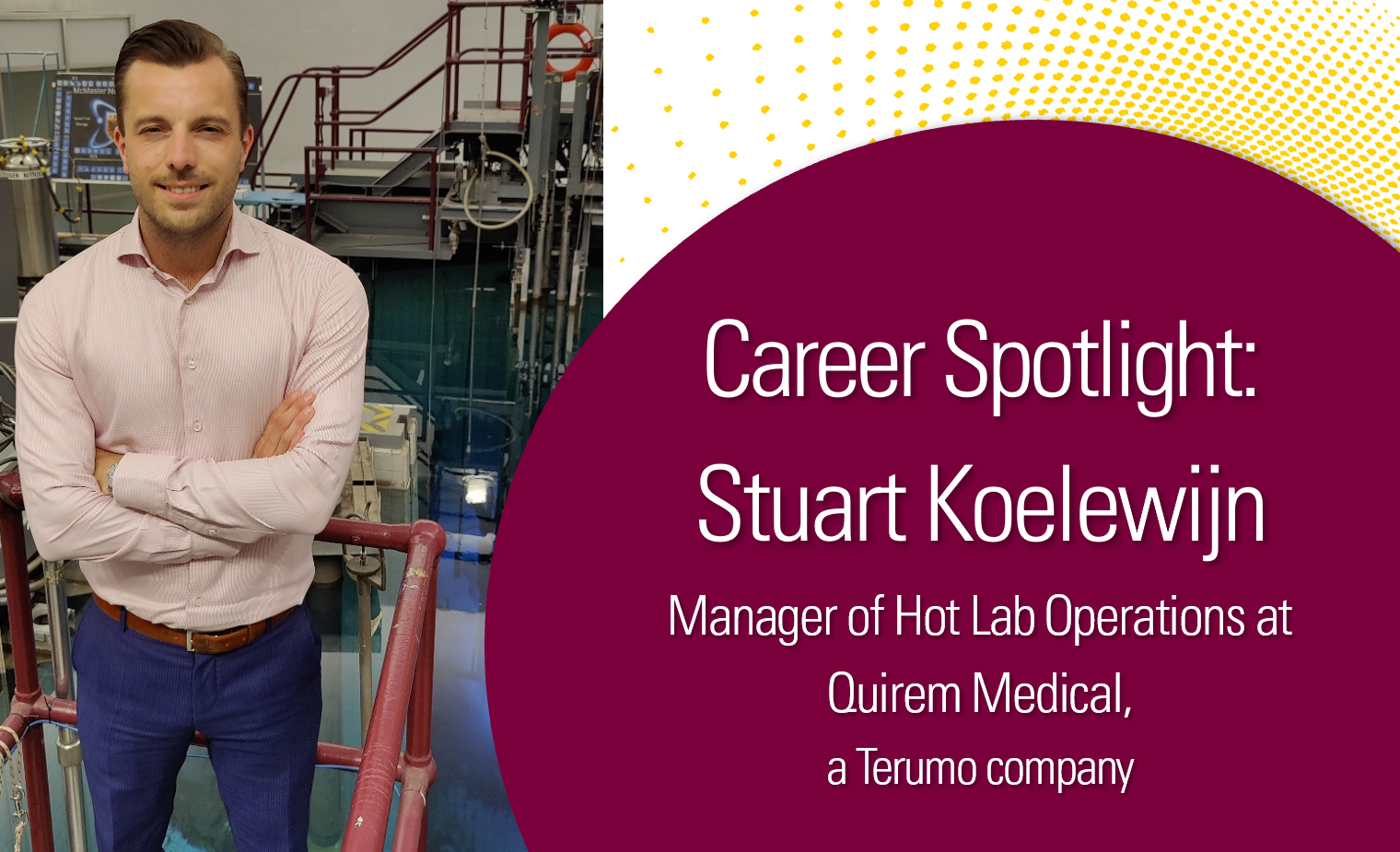Interview with Stuart Koelewijn, Manager of Hot lab Operations at Quirem Medical, a Terumo company

Stuart Koelewijn is Manager of Hot Lab Operations at Quirem Medical, headquartered in Deventer, the Netherlands. Quirem Medical and McMaster University have been working together to manufacture QuiremSpheres® – the next generation of radio-embolization microspheres. QuiremSpheres® are a medical device containing the radioactive isotope Holmium-166. Through selective internal radiation therapy (SIRT), QuiremSpheres® are used to treat liver cancer. In the interview below, Stuart discusses his work at Quirem Medical and his experience collaborating with McMaster to manufacture QuiremSpheres®.
Tell us about your education. Where did you study, and what inspired you to pursue a career in nuclear medicine?
I completed my bachelor’s degree in biomedical sciences at the University of Rotterdam, the Netherlands. I’ve always been interested in biology, and I had a high affinity for science. My sister, who is six years older than me, also studied biomedical sciences, which intrigued me, so I simply followed in her footsteps.
What do you do at Quirem Medical?
I work as the Manager of Hot lab Operations. At our office in Deventer, we have a production facility where we prepare microspheres. The microspheres are shipped to and irradiated inside a nuclear reactor and are then sent to a hot lab. My job involves the creation of new hot lab locations and governing existing hot lab facilities, each designed under GMP standards. I provide guidance on the nuclear safety regulations and maintain the highest standards within the hot lab operations, ensuring that our regulations and highest quality are being met to safely and efficiently produce our final product.
What is a hot lab?
For the creation of radiopharmaceuticals, we need well-regulated and well-monitored areas that meet the highest quality standards. This means that we need a cleanroom – a clean area with a low particle concentration in the air, and with little to no spores and bacteria. Since we’re working with radioactivity, we need to provide an environment where workers can safely work with limited exposure to radiation. Therefore, hot labs have shielding measures in place, as well as monitoring systems to monitor the radiation workers are being exposed to, with a highly effective process in place to further reduce the exposure to as low as reasonably achievable.
Quirem Medical and McMaster University have been collaborating to manufacture QuiremSpheres®. What has your experience collaborating with McMaster been like so far?
In 2019, McMaster Nuclear Reactor had been requested to irradiate our intermediate microsphere product and then send it out to Europe for the final production steps. Personally, I began communicating with the McMaster team about a year ago, and I have to say that my communication with McMaster has always been positive and constructive. Moreover, Dr. Chris Heysel (Director of Nuclear Operations & Facilities) recently gave me an extensive tour of McMaster’s nuclear facilities , and it became immediately clear to me that McMaster is a highly innovative institution with exceptional capabilities.
What do you hope for the future of this collaboration between Quirem Medical and McMaster, and for the future of nuclear medicine more broadly?
Quirem Medical will collaborate with McMaster to ultimately supply treatment to patients in the United States and Canada. I would say this is only the beginning of our collaboration.
What is happening at McMaster is already the future – the technology being prepared, investigated, and applied is truly incredible. And in general, the field of nuclear medicine has been evolving already for the past few decades, leading, for instance, to precision medicine with new targets expanding the reach, and the pace is increasing now. I hope there is a better view from the general population on nuclear medicine, as they witness bigger pharmaceutical companies getting in on nuclear medicine more and more. Going forward in the future, I believe there will be a further increase of clinical need for nuclear medicine.
What kinds of skills are important for your job?
Taking initiative is the most important skill. We are in a field that is developing quite quickly, so we need people that will take the initiative to lead these advances and continued development. Having a constructive mindset is also important, as well as remaining vigilant in terms of radiation safety.
Which of your accomplishments are you most proud of so far in your career?
Providing the first commercial treatment by Quirem Medical. I started in 2016 to build the first hot lab, and in March 2017 we were able to treat the first patient. So, I think that would be my first milestone at Quirem Medical, but also one of my most important milestones.
Do you travel often as part of your job?
Like many of us, COVID-19 has made me stay home, but before the pandemic I was travelling quite a lot. Quirem Medical has a few production facilities – there are two in the Netherlands, and we have one near Prague, Czech Republic, so I often travel there.
Lastly, do you have a fun hobby you could tell us about?
I have two little children – so I have little time to spend on any hobbies right now! But otherwise, I enjoy reading books, particularly thrillers. I also used to draw a lot when I was younger – though my time is quite limited now, I definitely aim to pick it up again in the future.
Blog